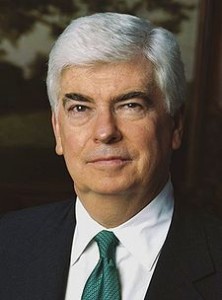MPAA’s Dodd: Hollywood is pro-Internet
December 14, 2011
By Colin Mann
 MPAA Chairman and CEO Senator Chris Dodd has reaffirmed the entertainment community’s commitment to both free speech and the fight against criminals who steal online content. In remarks to Washington, DC think-tank the Center for American Progress, Senator Dodd said that creative technology and creative content were “absolutely essential to each other” and that those on the creative content side of this equation took a back seat to no one in support of the Internet and its ability to flourish and open up new avenues of opportunity, education, freedom, and growth to millions.
MPAA Chairman and CEO Senator Chris Dodd has reaffirmed the entertainment community’s commitment to both free speech and the fight against criminals who steal online content. In remarks to Washington, DC think-tank the Center for American Progress, Senator Dodd said that creative technology and creative content were “absolutely essential to each other” and that those on the creative content side of this equation took a back seat to no one in support of the Internet and its ability to flourish and open up new avenues of opportunity, education, freedom, and growth to millions.
“Hollywood is pro-Internet. We stand with those who strongly oppose foreign governments that would unilaterally block websites, and thus deny the free flow of information and speech,” he averred.
“So I want to make it clear right at the outset that our fight against content theft is not a fight against technology. It is a fight against criminals. Nor is it a fight to protect a stagnant and outmoded business model. Indeed, it is fundamentally a fight to protect jobs,” he declared.
He noted that in order to fund future film and television investment and create new jobs, as well as pay the wages and pension benefits of today’s workers, the movie industry was constantly evolving its business model in response to what its customers wanted.
“Consumers want more options and more flexibility in how they obtain our film and television content, how they can experience this content, and how they can share these experiences with their friends,” he observed.
“It is exactly because our customers want to purchase and watch movies and TV shows anywhere, anytime, that we have made full-length, high quality versions of our content available to more than five dozen online services in the US alone – from our traditional partners in television, to gaming systems and online retailers, to new ventures devoted entirely to this space. And we have worked with mobile phone operators and service providers to develop new distribution systems, offering television streaming, on-demand movies, and TV shows on the go,” he explained.
He said that “very simply that we are in this together, Hollywood and Silicon Valley. Asking anyone to make a choice – one over the other – is lunacy. We need each other. But the underlying driver of our shared success is content.”
He described content creation as key to the movie industry’s economic success. “And the copyright that protects our content – the copyright that is being violated every day, and will continue to be violated until we act – exists to protect our workers’ ability to earn a living,” he stated.
